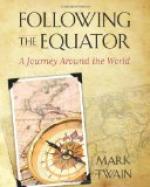This is indeed India! the land of dreams and romance, of fabulous wealth and fabulous poverty, of splendor and rags, of palaces and hovels, of famine and pestilence, of genii and giants and Aladdin lamps, of tigers and elephants, the cobra and the jungle, the country of a hundred nations and a hundred tongues, of a thousand religions and two million gods, cradle of the human race, birthplace of human speech, mother of history, grandmother of legend, great-grandmother of tradition, whose yesterdays bear date with the mouldering antiquities of the rest of the nations—the one sole country under the sun that is endowed with an imperishable interest for alien prince and alien peasant, for lettered and ignorant, wise and fool, rich and poor, bond and free, the one land that all men desire to see, and having seen once, by even a glimpse, would not give that glimpse for the shows of all the rest of the globe combined. Even now, after the lapse of a year, the delirium of those days in Bombay has not left me, and I hope never will. It was all new, no detail of it hackneyed. And India did not wait for morning, it began at the hotel —straight away. The lobbies and halls were full of turbaned, and fez’d and embroidered, cap’d, and barefooted, and cotton-clad dark natives, some of them rushing about, others at rest squatting, or sitting on the ground; some of them chattering with energy, others still and dreamy; in the dining-room every man’s own private native servant standing behind his chair, and dressed for a part in the Arabian Nights.
Our rooms were high up, on the front. A white man—he was a burly German —went up with us, and brought three natives along to see to arranging things. About fourteen others followed in procession, with the hand-baggage; each carried an article—and only one; a bag, in some cases, in other cases less. One strong native carried my overcoat, another a parasol, another a box of cigars, another a novel, and the last man in the procession had no load but a fan. It was all done with earnestness and sincerity, there was not a smile in the procession from the head of it to the tail of it. Each man waited patiently, tranquilly, in no sort of hurry, till one of us found time to give him a copper, then he bent his head reverently, touched his forehead with his fingers, and went his way. They seemed a soft and gentle race, and there was something both winning and touching about their demeanor.
There was a vast glazed door which opened upon the balcony. It needed closing, or cleaning, or something, and a native got down on his knees and went to work at it. He seemed to be doing it well enough, but perhaps he wasn’t, for the burly German put on a look that betrayed dissatisfaction, then without explaining what was wrong, gave the native a brisk cuff on the jaw and then told him where the defect was. It seemed such a shame to do that before us all. The native took it with meekness, saying nothing, and not showing in his face or manner




